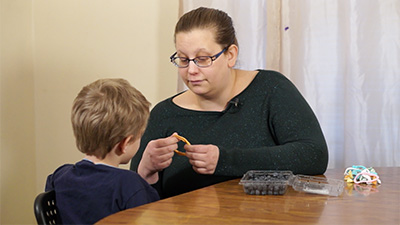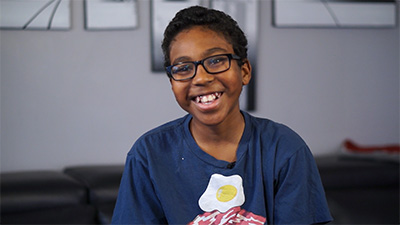Frequently Asked Questions
FAQs: Parenting Strategies
Q: When I give my child a direction, why is it important to use the word “now”?
A: The overall goal of giving clear directions is to help children learn to cooperate. Sometimes children don’t understand what it is we want them to do or when we want them to do it. For example, if you say “Put the plate in the sink,” it is not clear if you want this done right away or after the television show is finished or maybe sometime tomorrow. On the other hand, if you say “Put the plate in the sink, now please,” you are setting your child up to be successful by clarifying you want this done “now.” Making this expectation clear will help set the stage for cooperation.
Q: My child does not like to be touched. Do I still have to touch their shoulder or their arm when giving a clear direction?
A: No. You are the expert on your child. If you know your child does not like being touched, you can find another way to get their attention. This could include saying their name and getting close when giving a direction, but still respecting their space. Parents often find that standing to the side, about an arm’s length away from their child, is a helpful and non-threatening way to get their attention and give a clear direction.
Q: I am using the “Name, do _______ now please” phrase to give my child directions but they still are not cooperating. I find myself getting more upset each time I try to tell them something to do and they do not listen.
A: First of all, nice job working on your directions and remembering to use this phrase. Changing how you give directions can be challenging and it is clear you are working hard to try out this new tool.
A common bump that parents run into when giving directions is forgetting to monitor their tone of voice. Sometimes we do a great job getting the words correct, but use an angry or hopeless or threatening tone when doing so, and all the child hears is the emotion behind our voice. Before approaching your child to give a clear direction, take a moment to make sure you are feeling calm. If you are upset, try using an emotion regulation strategy first.
And don’t forget – we are not expecting perfection from our children or from ourselves. We can be happy when children cooperate about 70% of the time and we can celebrate when we are able to give clear directions about 70% of the time as well. We are all still learning.
Q: I have tried to control my emotions, but I just can’t seem to stop from getting mad or frustrated. What can I do about this?
Another good idea is to try out many different emotional regulation strategies. Different strategies work for different parents and in different situations. Feel free to experiment with a variety of strategies and then make note of the ones that work for you. Over time, you can find some tried and true strategies specific to your situation that help you stay calm, so you can set the stage for more positive interactions with your child.
A: You are not alone! Many parents find that regulating their emotions is a big challenge. One thing that may help is to try to identify times when you can feel your anger or frustration just starting to creep in. You may notice you are beginning to feel the emotion in a certain place in your body or that certain thoughts are forming in your head. Then, start using your emotion regulation strategies at this earlier point. This can let you manage those emotions before they start to feel overwhelming.
Q: Why should I praise my child for something they should already be doing? Isn’t it their responsibility to do what I tell them?
A: Try to think of praising your child as a way to teach them what they should be doing. You are their best teacher, so when you are able to praise your child for performing a positive behavior, this is a powerful learning opportunity. Children learn best when they receive encouragement and when we model this encouragement for them. Plus, most caregivers find they would rather praise positive behaviors.
Q: Why would I want to give my child a reward for following the rules? That just seems unnecessary.
A: Providing your child with a token or a reward for following the rules is a concrete way of letting them know they made a good choice. When we do not provide positive reinforcement for children after they do something good, their take-away message is less clear. In contrast, providing tangible rewards for positive behaviors enhances the learning process and helps pinpoint to children the positive behaviors we are looking for. And remember, these rewards are a learning tool; the idea is not to do this for everything or forever.
Q: Can I create a token system that has more rules to it? Or one that applies all the time?
A: The goal of the token system is to really focus on teaching a specific behavior – a behavior with just 2-3 key rules that takes place at a certain time or location. This clear focus will help direct the child’s attention to learning this behavior and will set them up to be more successful. It will also make it easier for you to notice when the child is following the rules and to provide their earned tokens. Once the child learns the behavior, you can then move onto another one after that. In this way, the token system can help you and your child make steady progress, one step at a time.
FAQs: Additional Resources
Q: Where can I learn more about the evidence-based parenting program that inspired MI Parenting Resource (i.e., PMTO)?
A: You can learn more about GenerationPMTO at their website.
You may also want to check out the book Raising Cooperative Kids: Proven Practices for a Connected, Happy Family available on Amazon.com. This book was written by the developers of PMTO and contains step-by-step details for using a number of positive parenting strategies.
Q: Does MI Parenting Resource offer therapy services?
A: No. MI Parenting Resource is a tool to support caregivers, but is not connected with specific therapy services for children and families.
For support accessing mental health services for your child, you can contact the Association for Children’s Mental Health (ACMH) at (888) ACMH-KID (226-4543). ACMH specializes in connecting families to needed therapeutic services in the community and school settings, and can walk caregivers through accessing both private and public mental health services.
If you are a caregiver looking for mental health resources, you may wish to contact your local health provider for therapy resources. Services may also be available through your local Michigan Community Mental Health Service Program.
Q: Can MI Parenting Resource connect me with general community resources for my family?
A: No. For local community resource support, nationwide, please dial 2-1-1 or visit 211.org. Operators can assist with information and referral for local and national social service programs, non-profit human service agency contacts, basic needs assistance, and disaster recovery.
Q: My child or I may be experiencing a mental health crisis. Does MI Parenting Resource offer crisis support?
A: MI Parenting Resource does not offer crisis support, but the following programs are available for assistance with mental health emergencies and crisis support.
If you are experiencing a mental health crisis and need immediate support, have life threatening injuries, or fear for your safety, please contact 9-1-1 for help.
Access to crisis mental health services are available 24 hours a day, 7 days a week through your local community mental health service provider. For a listing of providers in your community, please visit 211.org or call 2-1-1 to speak with an information and referral specialist.
The National Suicide Prevention Lifeline is available 24 hours a day, 7 days a week by calling 1-800-273-8255. Trained response specialists can assist with support and referrals as needed.
The Childhelp National Child Abuse Hotline is dedicated to the prevention of child abuse. Serving the U.S. and Canada, the hotline is staffed 24 hours a day, 7 days a week with professional crisis counselors who—through interpreters—provide assistance in over 170 languages. The hotline offers crisis intervention, information, and referrals to thousands of emergency, social service, and support resources. All calls are confidential. Call 1 (800) 4-A-Child or 1 (800) 422-4453.
FAQs: Technical Issues
Q: Do I need any special software to use MI Parenting Resource?
A: No, all you need is an updated version of your web browser – such as Google Chrome or Firefox or Microsoft Edge. The site will also work using the web browser on a smartphone or tablet since there’s nothing to install or download.
Q: What should I do if I forgot my password?
A: Please use the reset password form.
Q: I didn’t get my email address confirmation email. What should I do now?
A: Please contact us and we will check into this for you.
Q: How can I contact someone for support with website/technical issues?
A: Please contact us for support with website/technical issues.



